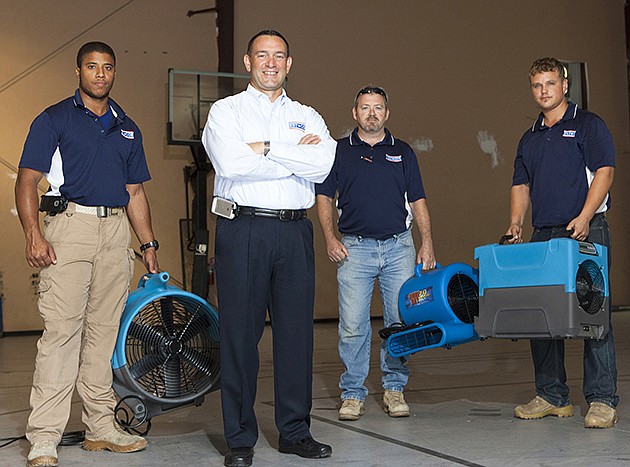- November 25, 2024
-
-
Loading

Loading

When Paul Huszar retired from 23 years in the military, he knew he wanted to continue to build strong teams as he did with his battalion in the Army. What he didn't know is that he would continue that role in an unlikely business: water mitigation. But the change didn't faze him.
“The cool thing about veterans that people don't understand is that we're used to changing jobs every two to three years,” Huszar says. “So I roll up my sleeves and figure it out.”
The 46-year-old veteran is leading VetCor, a company of military veterans focused on cleaning up water damage to properties as a preferred provider for insurance companies. Huszar says the company, which began in March, is expected to grow to $3 million to $5 million in revenues in the next 12 months, from eight to 50 employees in one year.
The rapid growth is nothing unheard of for Huszar, who was tasked to build Task Force Sapper, a battalion of 600 engineer soldiers in Baghdad during three months in 2008. “I like the challenge of it,” he says.
Huszar left the military as a lieutenant colonel after three back-to-back deployments to Iraq and nearly four of seven years in a row away from his family. “I loved the Army, but I didn't want to do that anymore,” he says. With family in Florida, the certified professional engineer started looking for work in Tampa.
During the job search process, “I had experienced some frustration about what people knew or didn't know about veterans,” Huszar says. Though people generally trust the military, they don't know what veterans can bring to the table, according to Huszar.
That was, until he met David Howard, the CEO of Tampa-based forensics engineering and geology company, SDII. Howard was a captain of the army and wanted to build out SDII's sister company, Cor Holdings, with a focus on employing veterans.
Howard and his partner, Robert Windschauer, hired Huszar just a couple weeks after announcing VetCor on Veteran's day last year. They wanted to create the water mitigation company after making their fortune on the sinkhole business through SDII. The business partners sought other verticals to expand to in insurance company service offerings and a way to normalize revenues.
Around 40% to 60% of property damage covered by insurance carriers in Florida is due to water damage, according to Huszar. Although many may assume the majority comes from flooding, it's actually from water line breaks.
VetCor's veterans work 24/7 to extract water and minimize restoration and repair costs using equipment such as industrial shop vacuums, dry fans and dehumidifiers. The firm measures exact moisture content in drywall and flooring.
The initial investment to start the company was small, $250,000, because VetCor was able to use warehouse space and three trucks already owned by SDII. A local services disabled veteran-owned small business, Neumann Construction, lent VetCor all of its equipment free for the first month and half. “We have a little bit longer runway, but turns out we don't really need it because we're doing really well, really quickly,” Huszar says. “It's such a substantial advantage because we're a startup, but we have a big brother, big sister right next door.”
After agreeing to be preferred providers for claims in the Tampa area for two large insurance carriers, VetCor is now leasing its own equipment at $3,300 a month. Huszar plans to expand service to five more Florida regions — Tallahassee, Miami, Fort Myers, Jacksonville and Orlando — in the next 12 to 18 months, opening one location every 90 days.
Huszar is convinced that his company has a competitive advantage by only hiring veterans, for the company's values are already internalized by military employees. “This is nothing compared to living in a hole in Iraq,” he says.
He also credits programs through the Department of Veterans Affairs for helping the business grow. He's currently utilizing the Special Employers Incentives Program, which provides half of an entitled disabled veteran's salary for the first six months on a new job. He also uses on-the-job training programs for veterans with disabilities, which covers water restoration courses from the Institute of Inspection Cleaning Restoration Certification Program.
He hopes that after going through the experience, he can help other Tampa-area businesses understand the significance and advantages of hiring veterans. According to Huszar, the VA is too bureaucratic to help solve the veterans unemployment problem. “Only the private sector can really help put a dent in this,” he says.
“We have to overcome the stigmas or lack of understanding” of what vets can bring to the table, Huszar says. “But I salivate at that because it is such an easy challenge to overcome.”